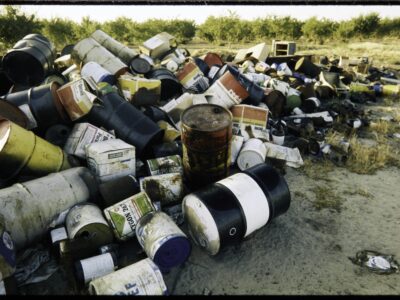Turning Conservative Legal Theories Against Trump
Is the risk of legitimizing bad ideas worth it? Maybe so, under the circumstances.
Should we use conservatives’ ideas to fight the current threat to democracy and the rule of law? Can we afford not to? For decades, conservatives have been obsessed with the idea of a runaway federal government crushing everything in its path. They’ve been successful in promoting ideas to rein in Leviathan, at a time when by our lights the government was behaving very reasonably. But now we really do have a rampaging federal government. Conservative ideas c...
CONTINUE READINGWhat the Hell Happened To The Sierra Club?
Its recent implosion over left-wing politics shows a trend that threatens environmental advocacy.
In an era of growing American fascism, for progressive organizations, there are successful strategies, and unsuccessful strategies. And then there is the Sierra Club, which appears to have destroyed itself, according to a depressing and enraging expose in the New York Times (co-written by David Fahrenthold, one of their best reporters): “Sierra Club is in a downward spiral,” a group of managers wrote in a letter reviewed by The New York Times to the club’s lea...
CONTINUE READINGAmerica’s Dirty Pictures: The Forgotten ‘Documerica’ Reminds Us How Far We’ve Come
The Documerica project, housed at the National Archives, provides a vivid window into environmental destruction circa the 1970s.
In recent decades, environmental laws have not only been challenged in courts and Congress; they’ve also taken a verbal beating. They’ve been denounced as “job killers”, “government overreach,” “radical environmentalism,” a “war on coal,” and, lately, just “woke.” It’s become all too easy to focus on the costs of regulation and forget why we adopted them in the first place. Or worse, to take their benefits for granted. This is a consequence ...
CONTINUE READINGThe Lingering Legal Issue of California’s Limits on Vehicle Emissions
The issues are complex, but the state has some strong legal arguments on its side.
Although Congress vetoed California's most recent vehicle regulations, the state can pass new regulations so long as there are significant differences from the ones Congress overturned. The Trump Administration has been arguing all along that California lacks the power to regulate greenhouse gases from vehicles. Those regulations are a crucial part of the state's climate poliy. Sooner or later, courts will need to decide the extent of California's legal authori...
CONTINUE READINGGood COP, Bad COP in Belém, Brazil
The Drain is a weekly roundup of environmental and climate news from Legal Planet.
The United Nations mega-conference focused on climate change known as COP (“Conference of the Parties”) is well underway in Belém, Brazil with 193 countries plus the EU, 57 heads of state, 39 ministers and hundreds of governors, mayors, and local officials participating. Two of my UCLA Law colleagues are on the ground in Belém this week and will be sharing updates. Despite — nay, because of — the Trump administration’s absence, media interest in the clima...
CONTINUE READINGFixing Fix Our Forests
The emergency provisions of Fix Our Forests are a key weakness in the bill
The permitting reform bill that has made the most progress through Congress is the Fix Our Forests Act, which I’ve written about here, here, and here. And as I’ve written before, fixing fire management on federal lands should be a top priority for any reforms. I’m not sure that the model of Fix Our Forests is the best approach to reform – I hope that I’ll have more details on what I think the better approach is soon – but as I’ve said, it’s probably b...
CONTINUE READINGShould Private Firms Be Involved in Cooling the Planet?
Private firms like Stardust Solutions want to get in on planet-cooling interventions. Here’s the OK, the bad, and the ugly about startup involvement.
A story at Heatmap News last month reported that an Israeli-American startup firm, Stardust Solutions, has received $60 million in venture funding for a new type of particle they propose can be used to inject in the stratosphere to reflect a little sunlight and (temporarily, imperfectly) reduce global-average heating from greenhouse gases. The company aims to patent their new particle and sell the technology to governments, which would presumably develop the other te...
CONTINUE READINGWhat to Know About the TFFF Announced at COP30
A bold new investment fund aims to channel billions into tropical forest protection – one key change can make it better.
The world is losing vast swaths of forests to agriculture, logging, mining and fires every year — more than 20 million acres in 2024 alone, roughly the size of South Carolina. That’s bad news because tropical forests in particular regulate rainfall, shelter plant and animal species and act as a thermostat for the planet by storing carbon, keeping it out of the atmosphere where it would heat up the planet. The United Nations estimates that deforestation a...
CONTINUE READINGRoadless Rule Revisited
Rationale for revocation of the roadless rule does not add up
The roadless rule, promulgated in the Clinton Administration, but not free from litigation until the first term of the Obama Administration, set aside about 2% of the land area of the lower 48 United States from commercial development. It applies to roadless areas of National Forests, and prohibits commercial logging and road construction in those areas. The Trump Administration has started the process of repealing it. What is the Trump Administration’s argument...
CONTINUE READINGAnother Threat to Advocacy Groups
The new regulation on loan forgiveness bodes no one good.
A new Trump Administration rule restricts which organizations qualify as engaging in public service. Unless an organization qualifies, its employees won’t benefit from student loan forgiveness programs. That would cut into their workforce. On the face, the standard seems reasonable: organizations must "not engage in activities such that they have a substantial illegal purpose.” But when you dig beneath the surface, the whole rule turns out to be legally dubious...
CONTINUE READING











